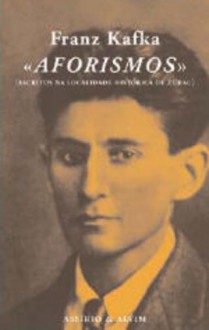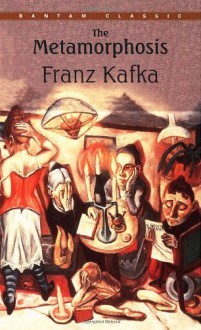Books of 1916: Part Two
The Metamorphosis by Franz Kafka
Since childhood I’ve been familiar with the plot of this short novel; people talk about it all the time because it’s so compelling. I even had the first sentence memorized thanks to my older brother. Reciting it was a warm-up exercise in some sort of theater class he was in, except for some reason they added an extra word, making it: “When Gregor Samsa awoke one morning from unpleasant dreams, he found himself changed in his bed into a monstrous vermin sofa.” And yet I had never even read one word of The Metamorphosis before now! It was so much more awesome than I was even expecting. So dark and weird and sad but a little bit funny.
Gregor realizes straightaway that he has become a monstrous vermin, but he’s mainly worried about how he will get to work on time and what would happen to his family if he lost his job. I was thinking, oh Gregor, you’re worried about the wrong thing, you just can’t face what your real problem is. But you know what? He absolutely was worried about the correct things. It’s becoming more and more clear that I’m the one who’s always worried about the wrong thing.
My wife wanted to know what does this story mean, on a metaphorical level. I never think about stuff like that. But I think it is a metaphor for being a lowly creature trapped living at home with your parents. Gregor is the ultimate back bedroom casualty. He literally can't leave his room after he transforms into a bug. Also it's about humanity, and the way we treat the Other, including non-human animals. Gregor is the one who is no longer a human, but his family are the ones who treat him so cruelly without sympathy or understanding, even his sister who started out being the caring one.
Understood Betsy by Dorothy Canfield
I can’t even remember when I first read this; presumably as a child. I think it deserves a much greater reputation as a children’s classic than it has. It’s about a little orphan girl, Elizabeth Ann, who is being raised by her two overprotective, uptight, city-dwelling aunts. Poor Elizabeth Ann is frail and vaguely sickly and afraid of everything, just like her aunties who “understand” her and smother her with love. When a family illness means she must be sent away to stay with another branch of the family who live way out in the country, she is terrified. But she blossoms as she encounters nature, animals, having responsibilities, doing things for herself, and especially her brusque but kind, plain-spoken new family. Elizabeth Ann (now Betsy) begins attending a one-room school house that amazingly seems exactly like a Montessori school, and she makes friends for the first time. The part where Betsy is left behind at the Fair, and the ending where Betsy must choose where she is going to live, elevate this book into a masterpiece.
Rinkitink in Oz by Frank L. Baum
I love the Oz books. Rinkitink is a jolly king with a talking goat who has to go on a dangerous journey with young Prince Inga. As a matter of fact, they’re not in Oz but in a nearby fantastical land. Prince Inga has three magical pearls that guide him, and he tries to hide two of them in the pointy toes of his shoes. But the shoes get thrown away and then they’re really in trouble. You think you won’t see Dorothy but at the last minute she and the Wizard and Ozma show up to save the day.
Usually you can count on the Oz books to leave out the racist garbage that is so prevalent in the books of this time period, but there was a horrible bit at the end of this one that I had forgotten which involves transforming the talking goat back into Prince Bobo of Boboland, and there’s even an illustration. If I were reading this book out loud to a young child I would skip over that part.
Unfortunately there aren’t that many Oz books left as L. Frank Baum is due to die in 1919. Do you think I should keep on reading the sequels by Ruth Plumly Thompson, who took over the series after Baum’s death? I have a couple years to make up my mind.
Backwater by Dorothy Richardson
The second in Richardson’s modernist, stream-of-consciousness novels about an English girl who has to become a teacher because her family has fallen on hard times. There are thirteen of these books and the series is called Pilgrimage. Last time she was working at a German boarding school, and this time she is at an English school. I love the way the main character Miriam’s mind works. Her romantic mooniness is so real and relatable. The most touching part was when she discovers a lending library where she can read the complete works of Ouida, which have always been forbidden to her because they’re too smutty. This novel really shows how when you have a rich inner life you will find splendor and meaning somewhere, even in the most depressing or banal surroundings. Unfortunately there’s a section when she’s on holiday at the seaside and there are some musicians who are described with the n-word repeatedly.
Leatherface by Emma Orczy
Just like last year, the Baroness is the only one who takes the horrors of war head on. Again it is historical fiction, set in Belgium (who wouldn’t feel for brave little Belgium in 1916?) during the Spanish Inquisition. A dashing hero known only as Leatherface because of the mask he wears has been protecting the Prince of Orange and doing other brave deeds for the cause. Fans of Baroness Orczy’s Scarlet Pimpernel series won’t be surprised to learn that it is the lazy, good-natured, tavern-loving man about town character who is actually Leatherface, or that the female protagonist is torn between her family duty to unmask Leatherface and her love for him.
A bit of altar diplomacy has brought Leatherface and this beautiful Spanish lady together into a marriage in name only, but it turns out to be one of those things where they fall in love after they are married. (I asked my brother if there was a name for this trope, and he suggested A Convenient Marriage since Georgette Heyer wrote at least four novels on this theme and one of them was called A Convenient Marriage.) I ate all this intrigue up with a spoon. But the bulk of the novel is about the horrors of war and people getting killed, killed, killed.
In the end, the town of Ghent escapes complete annihilation but the people allow Spanish supervillain the Duke of Alva to go free. “Perhaps they had suffered too much to thirst for active revenge,” is the book’s closing line, which I found unexpectedly pacifistic and moving. Also hats off to Emma Orczy for FINALLY laying off the anti-Semitism for one entire book except for a single one-liner.


 Log in with Facebook
Log in with Facebook 


















